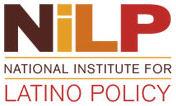
NiLP Commentary
Latinos and the Challenges of the Current Political Conjuncture
By Angelo Falcón
The NiLP Report
 As Trump's White House continues to descend into more and more chaos
and he becomes more and more paranoid and controlling, instead of being
on the offensive in the national interest, much of the Latino leadership
on each coast appears to be mostly on the defensive primarily on the single
issue of DACA or Puerto Rico's recovery. National Latino organizations
in Washington, DC continue to oppose budget cuts in a variety of policy
areas but are not proposing any new issues. This, of course, is understandable
with a "reality" TV star President and a Congress captured by
an extreme Rightwing. But in pursuing the best interests of the nation's
60 million-plus Latinos (I include Puerto Rico), is this the best or only
possible approach?
As Trump's White House continues to descend into more and more chaos
and he becomes more and more paranoid and controlling, instead of being
on the offensive in the national interest, much of the Latino leadership
on each coast appears to be mostly on the defensive primarily on the single
issue of DACA or Puerto Rico's recovery. National Latino organizations
in Washington, DC continue to oppose budget cuts in a variety of policy
areas but are not proposing any new issues. This, of course, is understandable
with a "reality" TV star President and a Congress captured by
an extreme Rightwing. But in pursuing the best interests of the nation's
60 million-plus Latinos (I include Puerto Rico), is this the best or only
possible approach?
This is, everyone agrees, is an extraordinary period in American history. While the Trump phenomenon is the most visible manifestation of this literally on a daily basis, Trump and the uniqueness of this period are the result of a series of new developments. Among the most obvious is the role that social media is playing in upending many established political practices, including promoting globalization and fueling democratic social movements and initially unexpected anti-democratic responses. There is also the continuing dominance of a capitalism that is promoting increasing wealth inequality while at the same time alleviating absolute poverty around the world in its brutal pursuit of profits.
Despite all of these changes, it appears that most of the Latino leadership is proceeding as if very little has changed. They seem to operate with a puzzling faith that American political and economic institutions and values are not changing in radical ways, despite daily evidence that this is not, in fact, the case. This failure to see the need for a similar radical change in the way Latinos approach such a changing system is what defines the current state of defensiveness we find ourselves in today.
The DACA issue is an interesting case. On the one hand, the campaign waged by these courageous Dreamers has been inspirational and has definitely had a major national impact. But for all the energy and creativity that is being put into it, it is still a temporary measure that leaves out most undocumented immigrants and even puts the Dreamers parents and families in jeopardy under Trump's Reign of Immigration Terror. The federal courts have intervened in ways that I never anticipated to provide DACA with a short-term reprieve, leaving its future and even current implementation in doubt.
The case of Puerto Rico's recovery is another example. The role of the stateside Puerto Rican diaspora has been critical to whatever relief the hurricane-ravaged Island has had. But the appeal for help has been based on claims based on the diluted rights of a second-class citizenship and to urgent appeals to address an evolving humanitarian crisis. But with a hardhearted and extremely Rightwing Republican controlled Congress and President, these appeals and claims have fallen on largely deaf ears as Puerto Rico's colonial status has been confirmed and intensified time and time again by this poor treatment. This response has even surprised a usually pro-US and pro-statehood Governor of Puerto Rico. It appears that a different approach is required, as a growing number of activists are planning to look to the United Nations and other international bodies to make their case for a political status change. Others are talking about shifting the discourse to a demand for colonial reparations that will assist such a political transition.
The Trump Presidency should make it clear that the Latino leadership has become way too dependent on a Democratic Party that takes it for granted and is currently out of power. While many Latino leaders will agree that this has been the case, they haven't led a movement to hold the party much more accountable to their community. The bulk of Latino elected officials are Democrats, as are most of its political activists, but they have not seen the need to put the Democratic Party's feet to the fire as they would any other institution.
For example, NiLP has been slowly circulating a "Democratic Party Accountability Checklist" that includes a large number of concrete recommendations that the party needs to institute to being much more inclusive of Latinos. It is just a listing of ideas within the immediate ability of the party to implement that simply provides a framework for initiating action. However, there was almost no reaction to them or anyone stepping up to develop a strategy around them. Instead, our elected officials and most party activists continue to whine about the party in hushed tones.
The need for a new national strategy shouldemerge from the Latino community that builds on the broader intersectional interests that are emerging from the Trump resistance. This is a process that can only begin with the convening a major national summit that brings together all key Latino stakeholders to produce a progressive policy and political agenda. But this could only be effective if all existing national and regional Latino organizations can come together in ways that break down the usual barriers to cooperation that foster a self-defeating factionalism and confine advocacy to a unimaginative dead-end incrementalism. This would need to be a process that goes beyond existing coalitions to develop new collective approaches appropriate to confront head-on the dangers this current political conjuncture poses to the Latino community.
This is clearly a time to make history in the defense and extension of core American values that are the foundation of its currently challenges democratic system. Latinos need today to become more of a part of making that history.
Angelo Falcón is President of the National Institute for Latino Policy (NiLP). He can be reached at afalcpn@latinopolicy.org.
_______________________________________________________________________________________________________
The NiLP Report on Latino Policy & Politics is an online information service provided by the National Institute for Latino Policy. For further information, visit www.latinopolicy. org. Send comments to editor@latinopolicy.org.